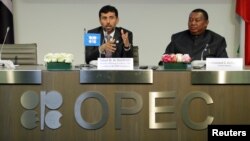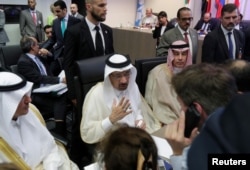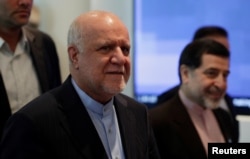OPEC ministers agreed Friday to increase oil output, a move that could ease supply fears and lower world prices, but uncertainties remain about the durability of the outcome.
The agreement theoretically sees OPEC raising crude oil production by a million barrels a day, but analysts say the output will be quite a bit less because some member states have production constraints.
Saudi Arabian Oil Minister Khalid al-Falih confirmed as much to reporters at the Vienna OPEC meeting.
"We know that not all 24 countries can produce above their targets, and which is the reason the cut has increased from 1.8 to 2.8 [million barrels per day]," he said. "So what the actual volumes are released into the market is going probably to be less than a million, but the nominal figure we're talking about is a million barrels."
While the production increase is small compared to OPEC's overall output, the cartel's decision to boost supplies is a first since 2017, when it started withholding oil to prop up faltering prices. But strong oil demand this year has given a big boost to prices — sparking calls by consumers for more output.
That sentiment was echoed by U.S. President Donald Trump, who tweeted Friday that he hoped OPEC would increase output substantially.
But it's unclear just how effective OPEC's decision will be in lowering prices in the longer term. U.S. investment bank Jeffries Group was reported as saying the supply boost could help offset declining production and exports by Venezuela and Iran, but it also would leave spare supply capacity at its lowest level in decades. Possible Chinese tariffs against U.S. oil imports, as part of an escalating trade war, is another uncertainty.
The OPEC meeting was marked by disagreement, with Iran's minister reportedly storming out of a meeting on Thursday. Iran opposed the output increase, while Russia and Saudi Arabia were for it. But Iran's oil minister, Bijan Zanganeh, told reporters the ministers had agreed to a compromise.
He said they agreed to manage the market so Iran didn't face difficulties and not to send the wrong signals to the international market.
Experts, however, believe the output increase will not benefit Iran, because the country is already exporting close to its maximum capacity. And the expected drop in oil prices will actually mean lower Iranian oil revenue.


